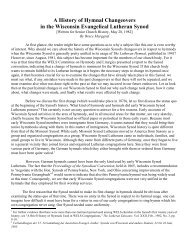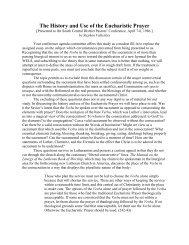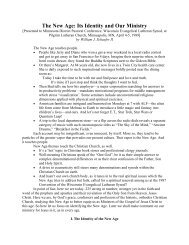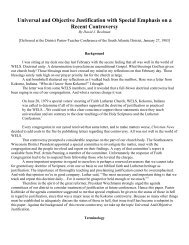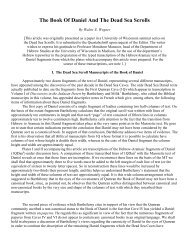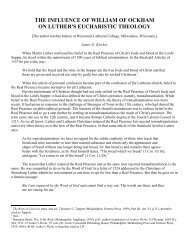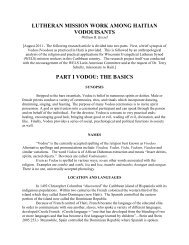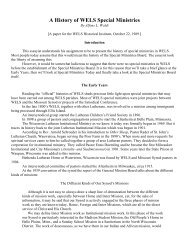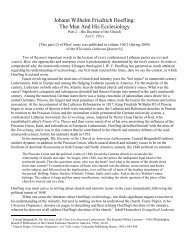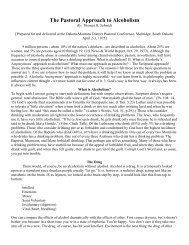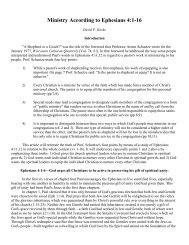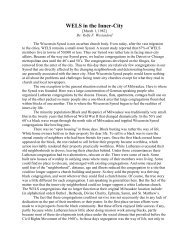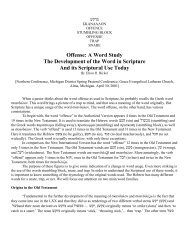Strangers to Sisters - Wisconsin Lutheran Seminary Library: Essays
Strangers to Sisters - Wisconsin Lutheran Seminary Library: Essays
Strangers to Sisters - Wisconsin Lutheran Seminary Library: Essays
Create successful ePaper yourself
Turn your PDF publications into a flip-book with our unique Google optimized e-Paper software.
The Confessions emphasize that it is the congregation alone<br />
which has the right and power <strong>to</strong> call a man <strong>to</strong> the divine<br />
office, but they nowhere say that it is only the man who is<br />
called <strong>to</strong> serve a local congregation of whom it can be<br />
affirmed that he holds the divinely established ministerial<br />
office. 272<br />
Lillegard quickly pointed out that the <strong>Wisconsin</strong> Synod did not teach that it is a<br />
matter of Christian liberty either <strong>to</strong> found Christian congregations or <strong>to</strong> have Christian<br />
ministers. However, the manner in which Christian congregations organizes or in what<br />
manner the divinely instituted office of the ministry is carried out is a matter of Christian<br />
liberty,<br />
When the <strong>Wisconsin</strong> Synod speaks about “Christian<br />
liberty,” in connection with the establishment of the various<br />
offices in the Church, it does not mean that the office held<br />
by the apostles was established in Christian liberty by the<br />
Church…but it does say that it was a matter of Christian<br />
liberty for the church <strong>to</strong> call one man <strong>to</strong> be a missionary,<br />
another a pas<strong>to</strong>r of a local congregation, another a<br />
supervisor or “bishop” (in the modern sense of the word),<br />
another a theological professor, etc. Churches may combine<br />
or divide these offices as they please and still be following<br />
the Scriptural teaching with regard <strong>to</strong> the public ministry of<br />
the Word…<br />
<strong>Wisconsin</strong> does not say that it is a matter of Christian<br />
liberty whether <strong>to</strong> found Christian churches or not. On the<br />
contrary, it agrees with Missouri…But <strong>Wisconsin</strong> does say<br />
that the manner in which the Christians organized, whether<br />
in small groups such as “the church in the house” referred<br />
<strong>to</strong> in Philemon 2, or in larger groups covering a whole city<br />
(I Corinthians 1,2 etc.), or in what we would call “synods,”<br />
i.e. including all the churches in a larger area in one group<br />
(Acts 9:31; Acts 15:23 “The brethren in Antioch and Syria<br />
and Cilicia”), --this was a matter of Christian liberty. We<br />
hold that on this point <strong>Wisconsin</strong> is right and Missouri<br />
wrong. 273 (Emphasis mine)<br />
272 Lillegard, Church and Ministry, 4.<br />
273 Lillegard, Church and Ministry, 4-5.<br />
146



